Japan takes a leading role in removing Ukraine’s landmines
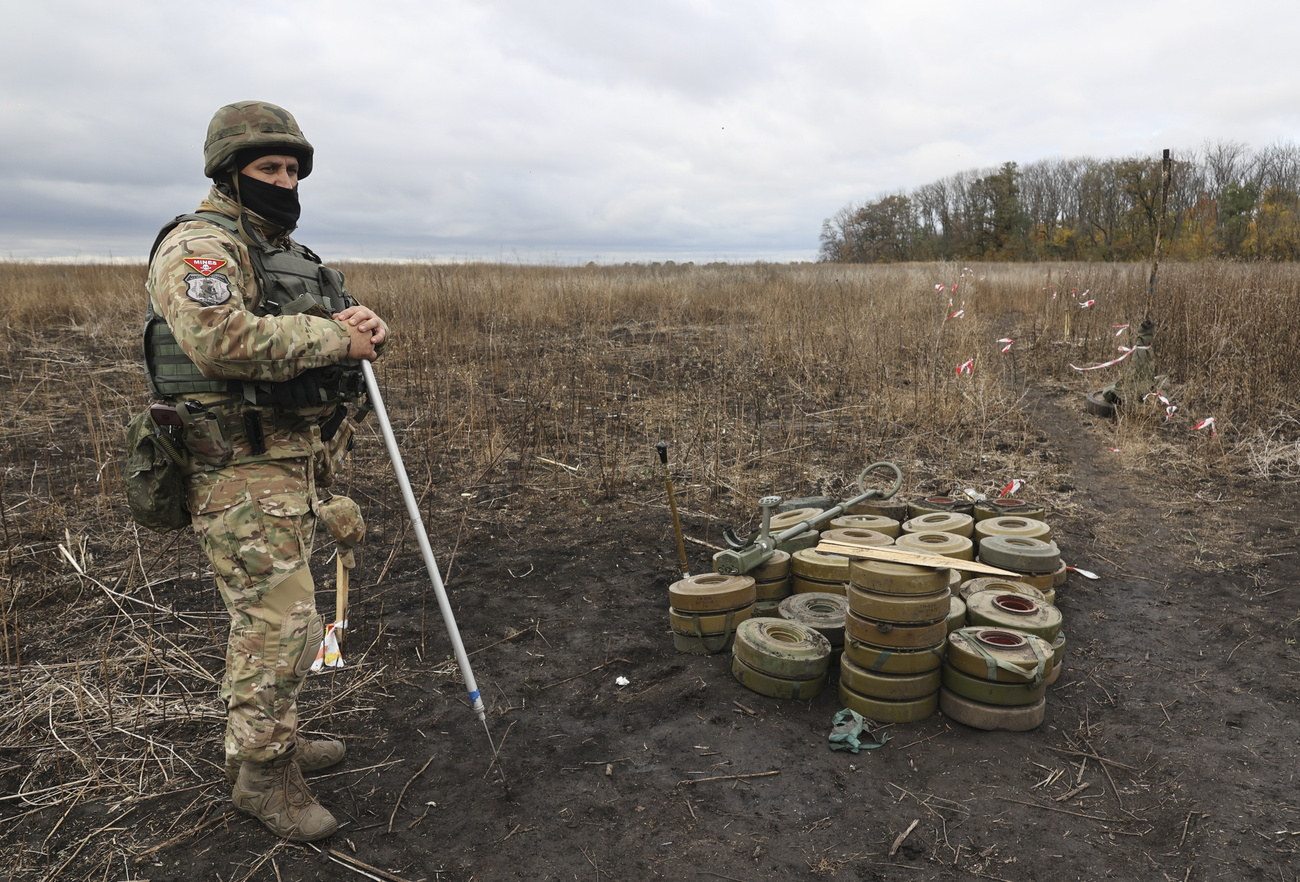
Landmines cover a quarter of Ukraine. A conference in Switzerland seeks solutions, with Japan, a global leader in mine clearance, playing a key role based on decades of experience.
“Japan will step up its efforts in the areas of mine clearance to enable the Ukrainian people to feel reassured as they reestablish their daily lives,” stressed Japan’s Prime Minister Fumio Kishida in his speech at the Ukraine Peace Summit in Switzerland in June, also indicating that Japan will host next year’s Ukraine Mine Action Conference (UMAC) which is this year being held in Switzerland.
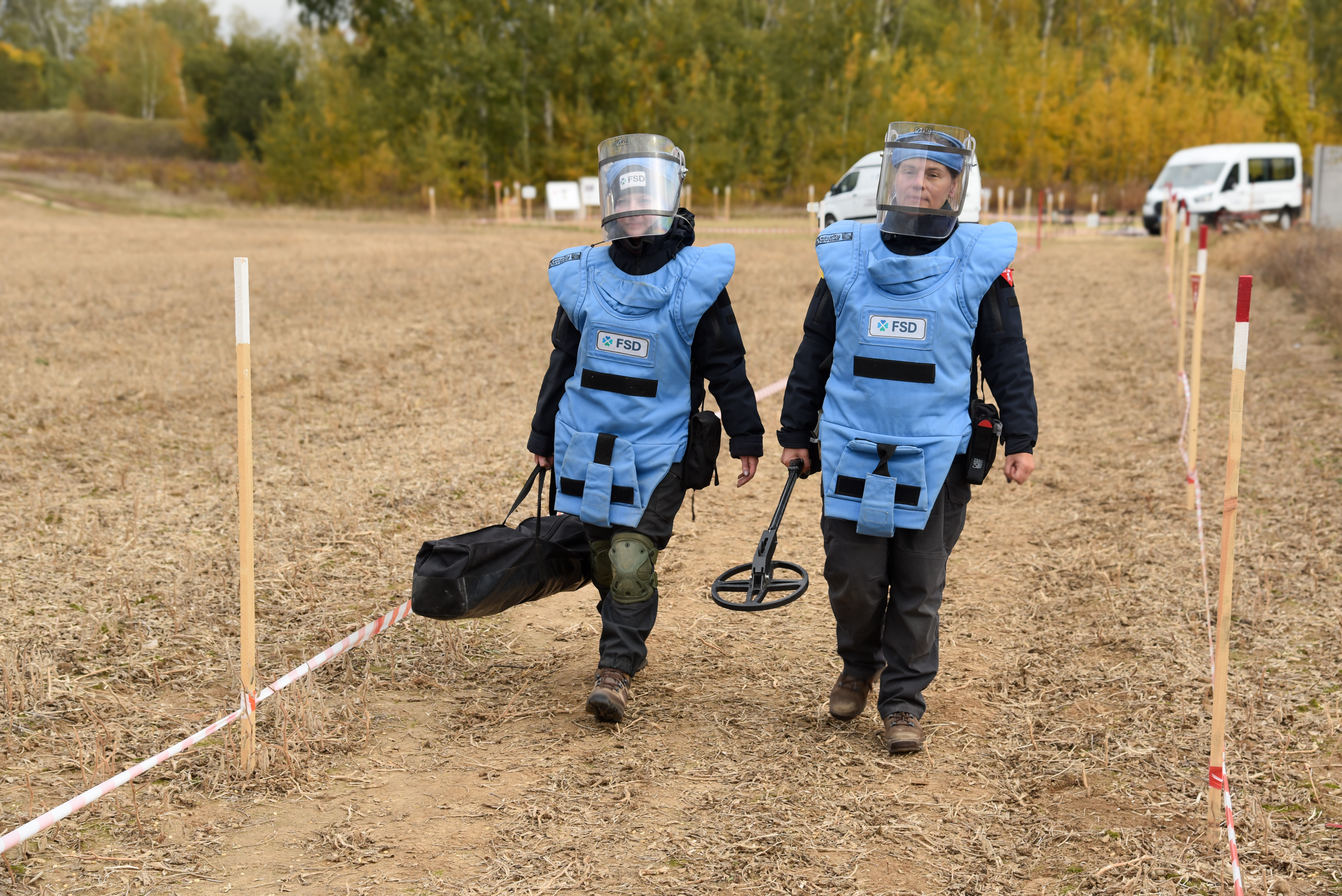
More
Key facts about Switzerland’s demining conference for Ukraine
Since Russia’s full-scale invasion of Ukraine in 2022, the Japanese government has continued to provide demining equipment and capacity-building support to the State Emergency Service of Ukraine (SESU).
In July, the Japanese government and JICAExternal link, the agency mandated to implement technical cooperation programmes, handed over four mechanised demining machines to Ukraine as part of ¥91 billion ($563 million) in grant aid aimed at assisting in its reconstruction.
The machines, manufactured by a Japanese construction machinery maker Nikken, are the first of their kind and can also be used for debris removal and tree trimming by replacing the tip of the arm. About 20 units will be delivered by the end of this year.
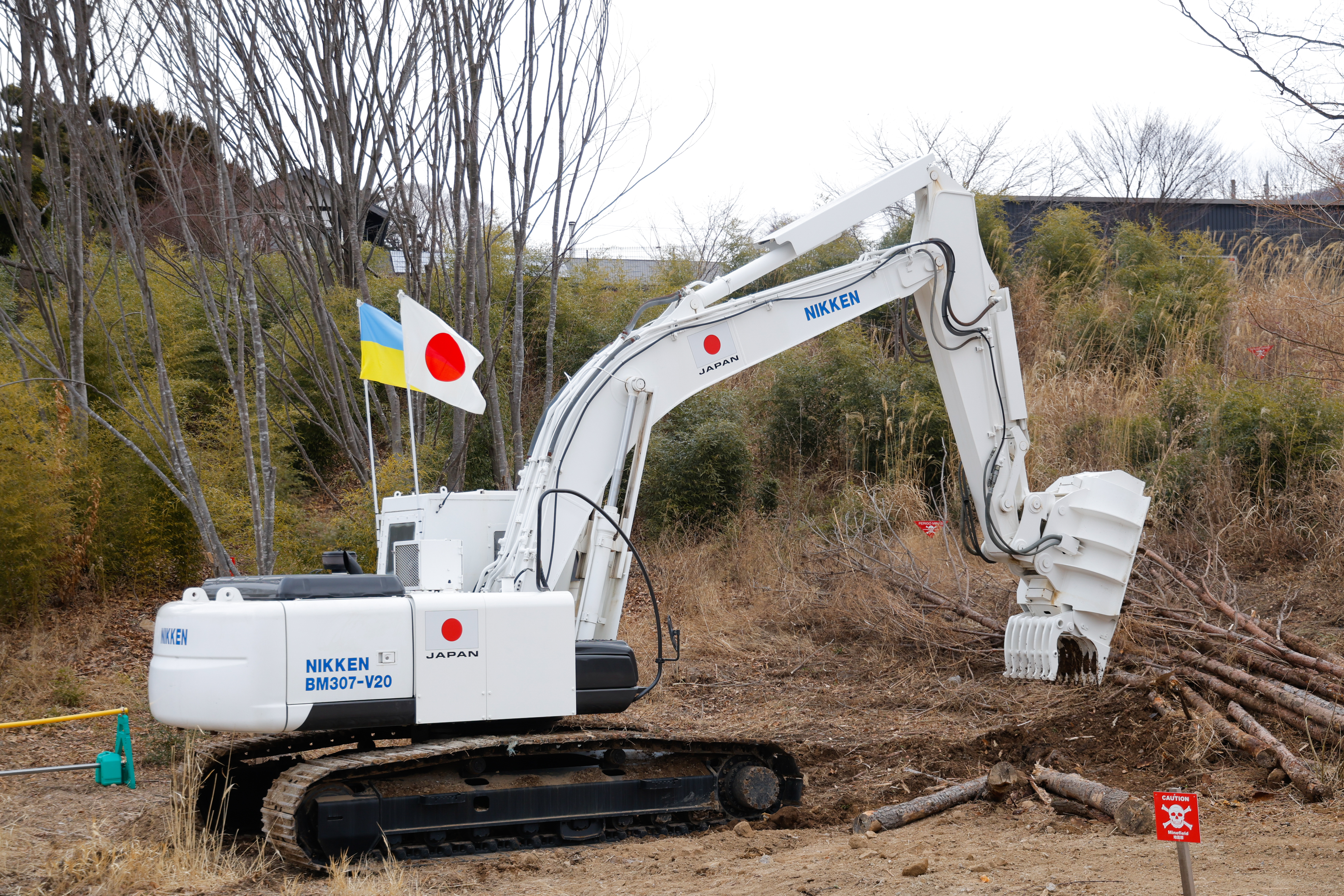
In 2023, Japan also provided Ukraine with 50 state-of-the-art compact landmine detectors developed by Professor Emeritus Motoyuki Sato of Tohoku University. The detectors, dubbed ALIS, combine a metal detector and GPR (Ground Penetrating Radar) to visualise buried landmines on a tablet PC screen. The system, which has been used in Cambodia, can quickly and accurately detect the location of landmines without digging into the ground.
>>Motoyuki Sato explains in this video how ALIS works:
But Japan prefers helping countries affected by land mines build the capacity to address the problem themselves. So far, JICA has conducted several training sessions for Ukrainian staff in Japan, Cambodia, and Poland. Fifty people from Ukraine have learned how to use and maintain mine detectors and demining equipment.
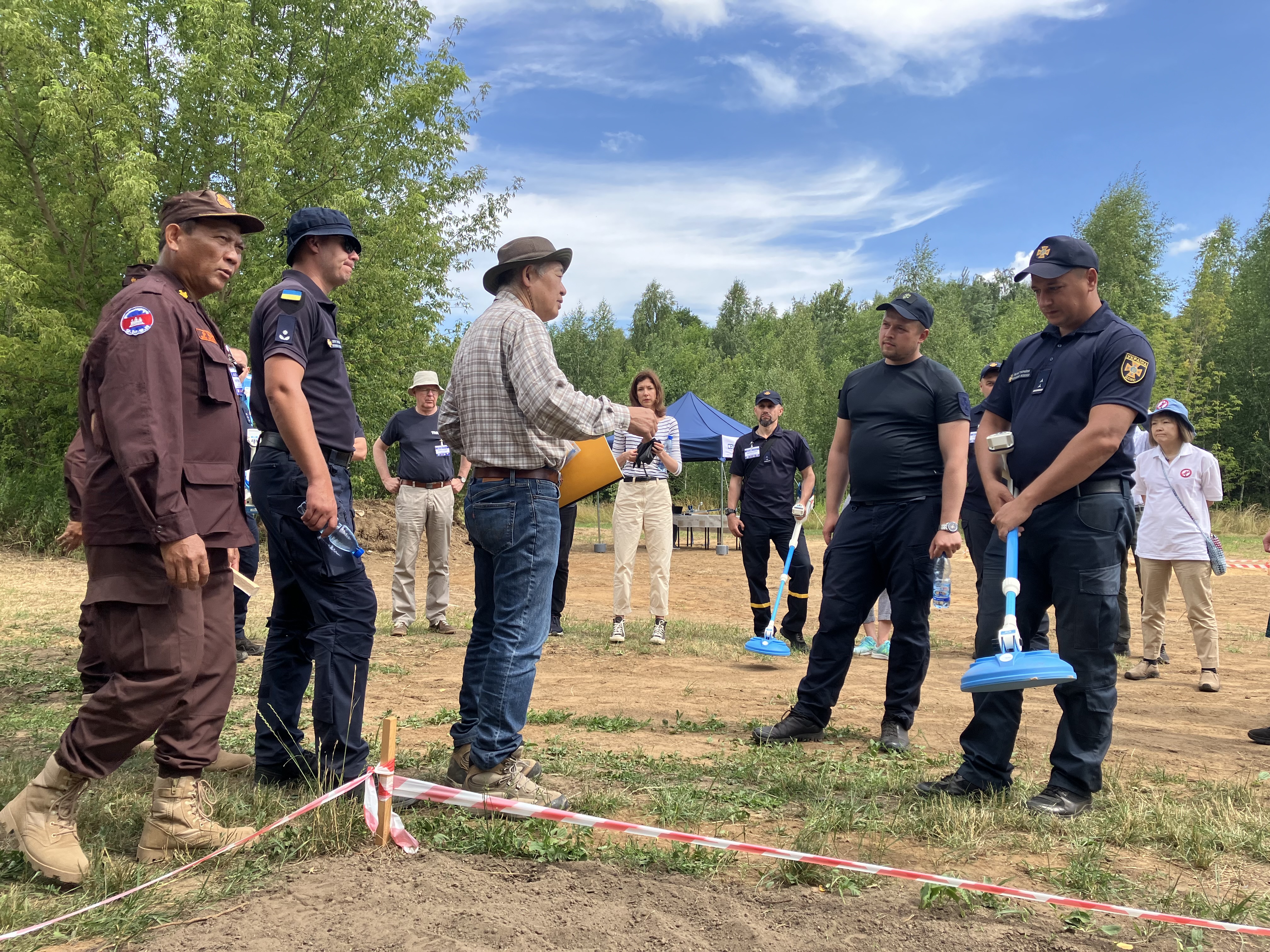
According to the Ukrainian government, about 23% of Ukraine’s land potentially contains landmines and other explosive hazards. Some six million people are currently living in high-risk areas. More than 900 civilians have been killed or injured due to land mines.
The war in Ukraine is still ongoing, and even if the war were to end, it would take many more years to clear the mines.
“Unlike other countries, we don’t just send people from Japan to help mine clearance. Our goal is to strengthen the capacity of the Ukrainian people so that they can plan and carry out exploration and removal of landmines on their own in the future,” says Ayako Oi, who leads the peacebuilding department at JICA.
25 years of mine-clearing experience in Cambodia
Since 1998, Japan has provided grant aid totalling more than 16 billion yen (CHF92 million) to Cambodia to assist in mine action. Cambodia was heavily affected by the Vietnam War and the subsequent civil war that lasted 20 years, in which an estimated four to six million mines were buried.
In the early 1990s, the international community grew increasingly concerned about landmines. Buried mainly in conflict zones like Cambodia, Afghanistan, and Angola, these mines have inflicted tremendous harm on civilians and severely hindered reconstruction and development efforts after the conflicts ended.
International NGOs pushed for the creation of the Anti-Personnel Mine Ban Convention (Ottawa Convention), which finally opened for signatures in 1997 and came into force in 1999. To date, 164 countries have signed or ratified the convention.
The defence ministry of Japan was reluctant to sign the treaty for security reasons, but Keizo Obuchi, then minister of foreign affairs, stressed the importance of the treaty and signed it.
In February 2003, Japan completed the destruction of approximately one million landmines in its possession.
The Meeting of the States Parties is held once a year to discuss implementation of the convention among parties, signatories, and international organisations.
Since 1998, JICA has supported the Cambodia Mine Action Center (CMAC), a Cambodian government agency, by providing equipment to improve the efficiency of mine clearance and building organisational management capacity, thereby helping Cambodia establish a system for self-sustained mine clearance.
CMAC increased the land area cleared of mines from approximately ten square kilometres in 1995-99 to approximately 282km2 in 2023.
Cambodia has now become one of the world’s most knowledgeable countries on mine countermeasures. JICA has been working to facilitate cooperation Cambodian officials and those in countries such as Colombia, Laos, Angola, and Iraq to share expertise.
Japan’s Foreign Minister Yoko Kamikawa recently announced a joint initiative with Cambodia to share knowledge and technology on landmine removal globally. As part of the initiative, Cambodian experts taught Ukrainian staff how to use the mine detectors.
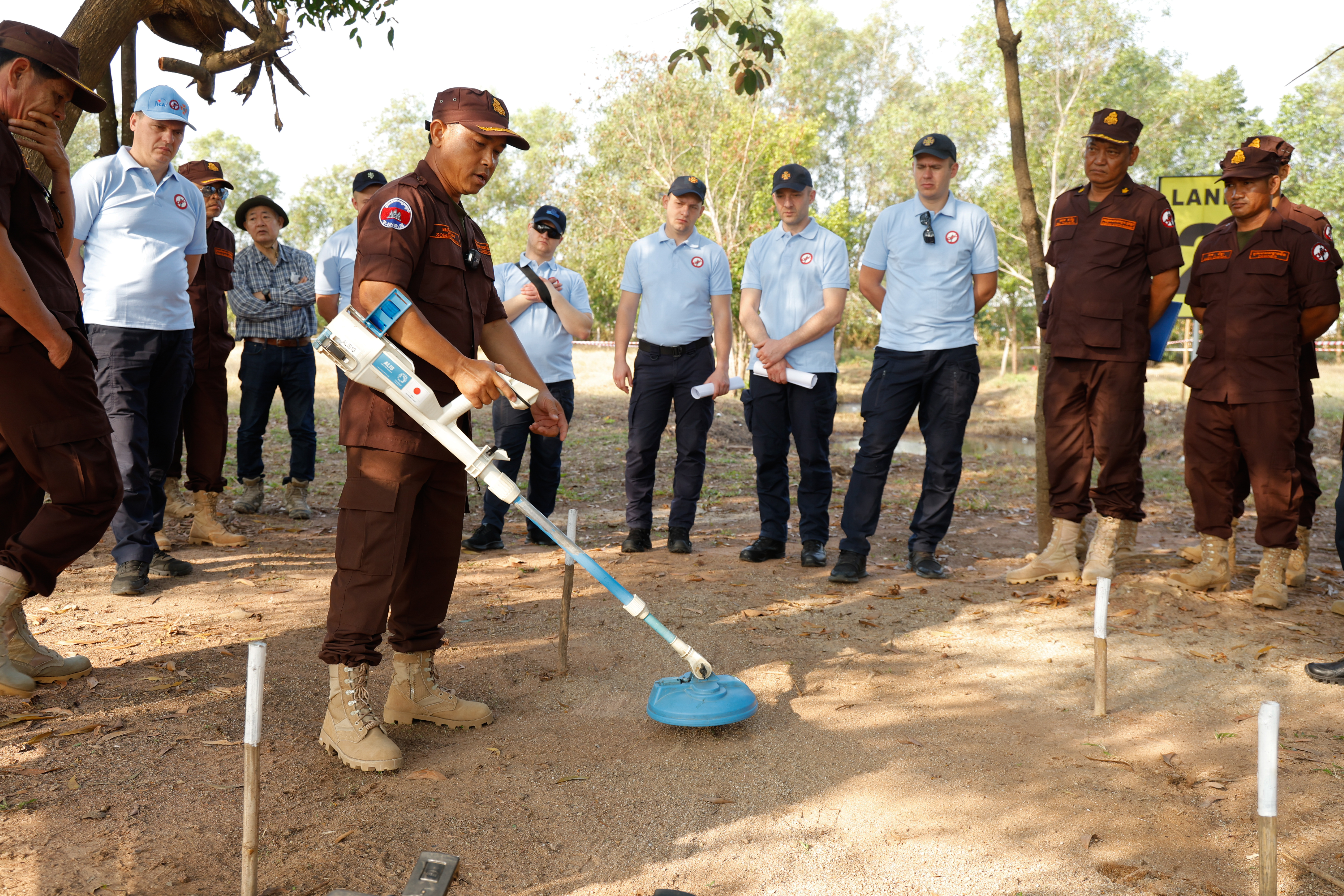
Landmine support instead of weapons exports
Japan is one of the world’s largest donors to mine action, consistently rankingExternal link among the top five donors between 2018 and 2022.
Japan has a strictly-regulated arms export policy, especially regarding weapons sent to parties involved in conflicts.
Like Switzerland, Japan came under pressure from the international community to relax its arms export policy following the Russian invasion of Ukraine. In March 2022, shortly after the invasion began, the Japanese government revised its operational guidelines for The Three Principles on Transfer of Defense Equipment and TechnologyExternal link, which allowed Japan to provide Ukraine with bulletproof vests and helmets as “disused items”.
At the end of 2023, the government again revised the arms transfer policy, which now enables Japan to export finished defense products made in Japan under foreign licences to the licensing nations. Shortly after, Japan approved a request from the United States for shipment of domestically produced Patriot air defense missiles to the US, prompting speculation they may be sent to Ukraine.
As is the case for Switzerland, however, most of Japan’s assistance to Ukraine is in the form of humanitarian and financial aid.
The Ukraine Mine Action Conference as a Japanese showcase Mine clearance assistance has therefore become a central part of Japan’s support to Ukraine, with Prime Minister Fumio Kishida securing Japan’s hosting of the 2025 Ukraine Mine Action Conference through a meeting with Ukrainian President Zelenskyy at the G7 Summit.
Japanese lawmakers hope that the Ukraine Mine Action Conference will also give Japanese companies opportunities to showcase their innovations in mine action. In addition to Nikken and Komatsu, which have developed cutting-edge demining equipment, IT giant NEC has developed artificial intelligence technology that can predict where landmines are most likely buried. NEC wants to use this technology in Ukraine in the future.
“Efforts to eliminate anti-personnel landmines are an essential element in protecting human security, which means creating a society where people can live in peace”, says Ayako Oi, head of JICA’s Peacebuilding department. “And I hope next year’s conference will further accelerate countries’ commitment to mine action in Ukraine.”
Edited by Veronica DeVore/ds

More
Our weekly newsletter on foreign affairs

In compliance with the JTI standards
More: SWI swissinfo.ch certified by the Journalism Trust Initiative








You can find an overview of ongoing debates with our journalists here . Please join us!
If you want to start a conversation about a topic raised in this article or want to report factual errors, email us at english@swissinfo.ch.